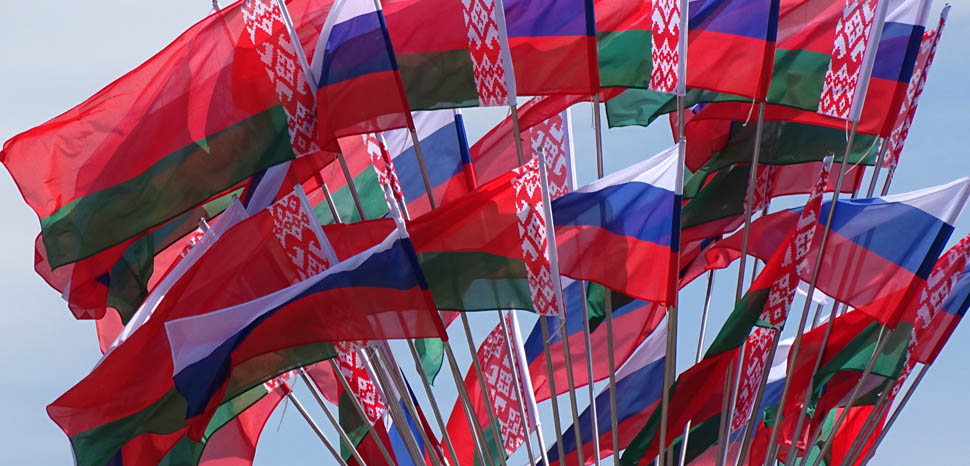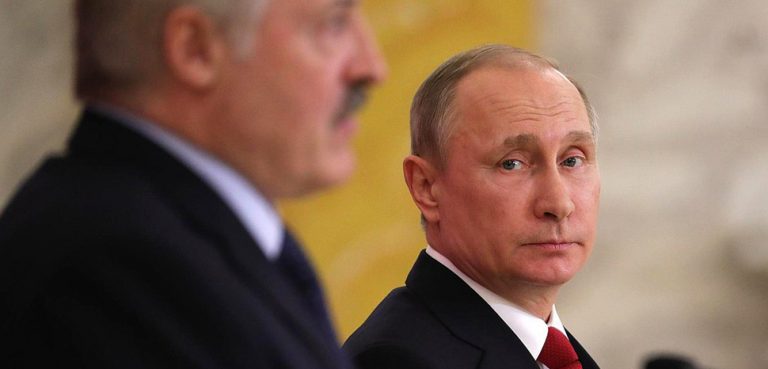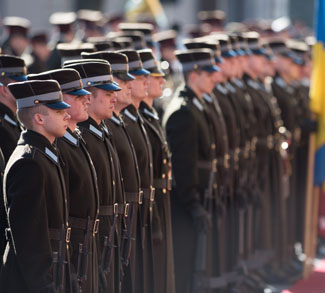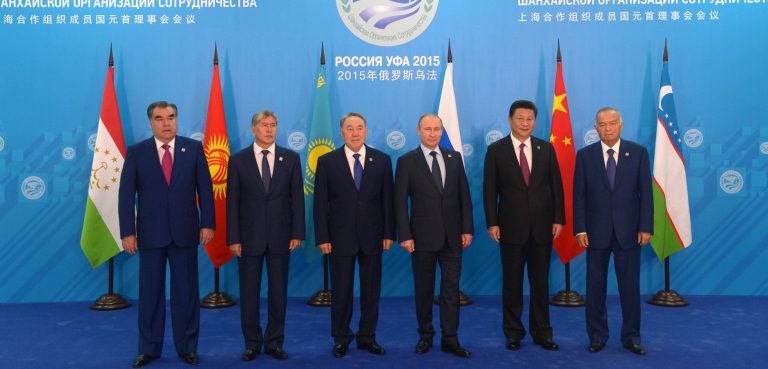The year 2020 opened with yet another high-profile dispute between Russia and one of its neighbors, Belarus, over costs related to the supply of oil and gas to that country. Until now, Belarusian President Aleksandr Lukashenko has been able to negotiate favorable terms for his country, a vital necessity given the near complete dependence of the Belarusian economy on the refinement and resale of Russian energy products. However, the decision taken by Russian suppliers to halt the flow of oil through the Druzhba Pipeline on January 1st did not arise out of purely economic considerations. Indeed, the decision was taken against the backdrop of a long series of negotiations that took place throughout 2019 aimed at deepening political and economic integration between the Belarusian and Russian states.
At the end of 2018, then Russian Prime Minister Dmitri Medvedev set the tone for Russian-Belarusian dialogue for the following year when he made clear that future negotiations on oil and gas prices would hinge on Belarus’ realization of stipulations outlined in the Union State Treaty of 1999. Though it is intended to bind the two states more closely, actual progress on this task was suspended until very recently. Nonetheless, Russia and Belarus engaged in bilateral talks over the past year. Work was undertaken on 31 so-called “road maps” for integration, and a final agreement was scheduled to be signed in early December. However, the summit held in Sochi yielded no results, and Lukashenko left his Russian counterpart, President Vladimir Putin, without committing his signature to any documents.
In spite of the abrupt end to the negotiations, the two parties convened once more at the start of February. Though no progress was made on the issue of integration, the meeting nonetheless affirmed that Belarusian refineries would continue to purchase oil from Russian oil companies according to global market prices, in addition to a deal which resumed the supply of natural gas at the cost of $127 per 1,000 cubic meters – the same rate which had been applied in 2019. Although the dust has temporarily settled, it is unlikely that the issue will simply go away, or be resolved in a manner that is satisfactory to Belarusian authorities. Given the vast, asymmetric expectations of both Moscow and Minsk, Belarus can expect to be the target of increased pressure. Lukashenko himself is acutely aware of this, and has pointed out that “Russia is afraid of losing Belarus,” but that it cannot support it without certainty over the direction Belarus’ policy will take.
At the same time, the whole episode has elicited hitherto unseen displays of political independence on the part of the Belarusian camp. Indeed, the gradual normalization of Belarus’ relations with the wider world, which has been taking place since the 2014 Russian annexation of Crimea, has transformed into a delirious scramble for allies and partners. In recent months, Belarus has courted the United States, Norway, Poland, Ukraine and Kazakhstan in an effort to supply its refineries in the short-term and improve its energy security. Additionally, a recent statement given by Belarusian Minister of Foreign Affairs Vladimir Makei urged that while maintaining a strategic and economic alliance with Russia remains a top priority, Belarus will “continue to strengthen relations on the Euro-Atlantic vector” – an indication that Minsk sees increased independence as a viable direction for its foreign policy, and not only an economic concern.
The actual extent to which Belarus is currently in the throes of a “geopolitical pivot”, or even a bid for greater independence from Moscow, remains questionable, however, and the reality of the country’s situation casts a long shadow of doubt over this perspective. In spite of the elation that Minsk’s recent actions have received from some Western media outlets and analysts, a series of sporadic decisions on the part of the Lukashenko administration do not necessarily constitute a trend. It should be pointed out that since the early 1990s, Belarus has signed onto every political-economic integration project that Russia has put forth to it; the two countries belong to the Eurasian Customs Union (ECU) and the Commonwealth of Independence States (CIS), and are linked together through a number of other institutional structures. Furthermore, the dependence of the Belarusian economy on Russia goes well beyond the need for a steady supply of energy products and an available market. Russia has also been a source for loans and subsidies which prop up the Belarusian economy to a significant extent. Finally, the overall situation on the European continent is not one that is conducive to Belarus’ search for allies. Between the plethora of crises, both ongoing and imminent, Belarus will likely be short of friends close to its borders that are able and willing to give it assistance.
Money makes Belarus go round
There can be no doubt that the reason for Belarus’ continued dependence on Russia can be readily explained in economic terms. Three decades have elapsed since the collapse of the Soviet Union, but many of the structural economic deficiencies that plagued its final years can still be found in Belarus today. The nature of the Belarusian economy is still characterized by a high degree of state management that has left the country in a cycle of perpetual stagnation. Though GDP growth over the last several years has remained relatively steady, a drop in 2015 notwithstanding, in January the Belarusian government reported that GDP had shrunk by 1.9% year-on-year, partially as a result of the ongoing energy dispute. Other metrics provide a fuller picture of the state of decline. Industry production also dropped by 5.8% year-on-year, specifically output in mining and quarrying (down 3.6% y/y) and manufacturing (down 10.5% y/y). Moreover, according to data provided by the National Statistical Committee, the net profit of Belarusian companies for 2018 totaled BYN5.2 billion (approx. USD$2.2 billion), nearly 40 percent lower than the final figures for the previous year. At the same time, 15 percent of companies operating in the country were declared unprofitable. Attempts to alter this scenario have so far floundered. Though there exist voices in Belarus which push for privatization and market liberalization, the Lukashenko administration, ever wary of rising public discontent and keen to maintain its hold on power, has been successful in resisting crucial economic reform.
In addition to the fear of potentially crippling social and political effects of economic restructuring, the drive for reform has also been stymied by the mere lack of necessity for such a course of action. For the greater part of the last thirty years, it can be stated that Belarus has greatly benefited from its relationship with Russia, especially when considering the generous support its energy sector has been able to extract. The mechanisms for a common energy market and pricing between Belarus and Russia were rapidly established by a series of treaties in the latter half of the 1990s. These stipulated that prices for natural gas exported from Russia could be no higher than those in the Smolensk region, which directly borders Belarus. Such conditions allowed Belarus access to Russian gas at a significantly lower rate than contract prices for Russian gas exported to the EU. As Alexander M. Zaborovskiy, a senior researcher at the Institute of Economics at the Belarusian National Academy of Sciences, has pointed out, Belarusian authorities were unconcerned by growing dependence, and the favorability of the terms precluded development of an independent energy strategy.
In spite of the gas disputes of the mid-2000s, for many years the effects of these subsidies were difficult to argue with. In 2012, the Institute of Economics reported that favorable energy prices accounted for USD$10 billion in savings for the Belarusian economy, or approximately 16 percent of its GDP. On a regional level, Belarus had the lowest cost of gas outside of Russia itself; until 2007, the price was between three to five times cheaper than it was in neighboring Poland. Even when Russia raised gas prices, the comparative cost still remained low. For instance, in 2015, the price of gas in Belarus for households averaged USD$168 per 1000 m³, whereas the cost was 160 percent more ($436/1000 m³) in neighboring Poland, and 103 percent more ($326/1000 m³) in Ukraine.
The impact of Russia on the overall health of the Belarusian economy extends well beyond its ability to control the cost and supply of energy resources. As has been previously mentioned, the Belarusian economy has endured in a state of subsistence on external loans. Apart from the International Monetary Fund, which places stringent and, as far as Belarus is concerned, essentially unreachable conditions for access to credit, Russia has been a key provider of financial assistance, albeit with strings attached. Though negotiations with the IMF are still on-going, Belarus has received approximately 70 percent of its loans and foreign direct investment from its eastern neighbor over the last decade. This includes intergovernmental loans, credits from the Eurasian Economic Community, as well as resources provided by Sberbank and the Russian stock exchange.
The relative ease with which the Lukashenko administration has, at least until very recently, been able to negotiate loans under favorable conditions has gone a long way in propping up the quasi-Soviet management policies underpinning the Belarusian economy. In the last few years, however, it would seem that this picture has been changing. Loans which were once generous have now shrunk to the degree that they can only be used to re-finance old debts, as Russia has insisted that borrowing be tied to further integration. Towards the end of 2019, the Russian-managed Eurasian Fund for Stabilization and Development (EFSD) withheld the last tranche of a USD$2 billion loan, while the former Russian finance minister, Anton Siluanov, stated that a further USD$630 million would also be withheld until Belarus “reached a general integration mechanism” with Russia.
Though the relationship between Belarus and Russia outlined above is one characterized by gross imbalances and political arm-twisting, it remains highly doubtful that any one country, or even a group of countries, would be capable of filling the economic void left by Russia should Belarus manage to break off its dependence on it. Russian pressure notwithstanding, the fact remains that Belarus has been, and will likely continue to be, unable to find a cost-effective alternative to Russian energy supplies, nor would it be able to secure a similar degree of investment from a third-party without serious alterations to its internal dynamics – something that top authorities in Minsk have proven time and again that they are unwilling to consider.
Belarus is not Ukraine
Much like the economic picture, the present political scenario across the whole of Europe is not conducive to Belarusian bids for greater independence from Moscow. The 2014 Ukraine crisis, and the subsequent Russian annexation of Crimea, impressed the need to make changes on the minds of the Lukashenko administration. In terms of Belarus’ external relations, this has manifested in a “soft rapprochement” with the West. The past several months have witnessed an uptick in Belarus’ contact with Western countries as the country has attempted to enhance its energy security. At the same time, a broader reshaping of the country’s external image has been taking place as Minsk has played the broker of international peace by being host to negotiations in the Russia-Ukraine conflict. However, Minsk’s dalliance with the West still faces considerable limitations.
Nowhere are these limitations more explicit than in Belarus’ contact with Europe, which for the last thirty years has remained essentially conflictual. The maintenance of good relations with the Europe Union is of the utmost importance if Minsk’s policy of strategic hedging is to be realized, however, as Yauheni Preiherman of the Minsk Dialogue Council on International Relations has noted, quantitative progress towards normalization has been modest at best, and bilateral relations with individual EU member states have also languished. For the Lukashenko administration, the moniker of “the last dictatorship of Europe” has proven especially difficult to shake off. A number of domestic policy missteps in the sphere of human rights coupled with Minsk’s uncompromising position on reforms, and suppression of civil society have contributed to a lack of trust in Minsk on the part of the EU. As such, Belarus has not seen the same degree of diplomatic investment that a number of other post-Soviet countries have received from the EU.
Belarus’ tenuous geopolitical position may also factor into the EU’s hesitancy to commit to a deeper relationship. The twin disasters in the EU’s policy of expansion – Georgia and Ukraine – have communicated to Brussels that considerable limitations exist to its attempts to gain leverage in the so-called “Russian world.” Nonetheless, the EU remains keen to limit Russia’s influence wherever it can, as demonstrated by the recent ascension of North Macedonia and Albania to the EU. However, Belarus’ membership in several Russian-led supranational institutions, and especially its commitment to integration with Russia as outlined by the Union Treaty, provides a binding, legal framework for the Russian sphere of influence it belongs to. Barring a radical course of action, Minsk may find that the strength of its relationship with Moscow impedes more of the meaningful contact it seeks with the EU. One must also consider the impact of the broad range of crises that the European Union is presently facing. From the fallout of Brexit to the on-going COVID-19 pandemic, it is to be expected that the EU will turn inwards.
Will Lukashenko’s luck run out?
Minsk’s careful balancing act these last several years has, in no small part, been predicated on the success of its leader, President Aleksander Lukashenko, who himself has been walking on a high wire. To an extent, the longevity of his tenure in office is a reflection of his ability to keep both domestic interests and interests in Moscow satisfied, at least insofar that Belarus has maintained its independence, and that he has held on to the reins of power. However, now that Russia is signaling that the “oil for kisses” policy is reaching an end, and that it will demand concrete action on political and economic integration from Belarus, has Lukashenko’s luck run out? In the immediate short term, the answer to that question is “no”, and the reasoning behind it lies far outside of Belarus’ borders.
The on-going price war between Saudi Arabia and Russia over the cost of oil has significantly altered patterns of oil consumption across Europe over the last month. European refineries such as Royal Dutch Shell, OMV and Total have recently tripled the volume of oil orders from Saudi Aramaco, as the cost of Saudi Arabian oil fell below the cost of Russian oil traditionally sold to the European market. As reported by Bloomberg, this has meant that the main oil brokers Russia has relied on, such as Vitol and Trafigura Group Ltd., were unable to find new buyers for Urals crude. The significance of the European oil market for Russia cannot be understated, and the idea that Russia could potentially lose its strategic position in this sphere has galvanized the Kremlin into making political adjustments.
Belarus has already been a chief beneficiary of these adjustments. On March 23, the state-owned news agency BelTA reported that Belarusian Prime Minister Sergei Rumas had met with his Russian counterpart, Mikhail Mishustin, to discuss the resumption of oil supplies to Belarusian oil refineries that had been cut off since January 1st. Though it appears that the looming shadow of the integration question was still on the table, Russia agreed to a startling discount on its oil, and will reportedly supply Minsk with 480,000 bpd at $12 to $15.7 per barrel. This news was coupled with a declaration by First Deputy Prime Minister Dmitry Krutoi that Belarus would work with its creditors in order to restructure some of its external debt, as well as to seek financial aid to deal with the COVID-19 crisis.
With the settling of the oil dispute, at least for the time being, Lukashenko has gained some much-needed breathing space. Indeed, the next several months will be crucial in determining if Minsk will be able to use this period effectively to bring about fundamental changes to both its domestic and foreign policies. If history is any indication, however, the world need not hold its breath. Lower oil prices from Russia are indeed a victory which the Belarusian economy will be able to take to the bank, nonetheless, the arrangement does nothing to curb Belarus’ long-standing dependence on the Russian energy market for supplies. Should oil prices rebound, the country may once again find itself in a difficult negotiating position, similar to the one it found itself in December 2019/January 2020.
At the same time, the Lukashenko administration has been in power for the last thirty years, giving observers a long, unbroken track record with which to work with. If the authorities in Minsk have proven anything in that time, it is that they will resist any far-reaching changes which could bring about social disruption, or that could lead to a loss of power. Even if Belarus were to make good on the necessary reforms that would give it a better relationship with the West, it may find the scope of its actions limited by Moscow. It is important to remember that the integration of Russian and Belarus has been on the table for a very long time. Moscow may have decided that the pursuit of this policy may have to take a back seat to its much larger strategic interests in Europe, but it is unlikely to simply forget about it. Should Belarus’ overtures to the West develop into strategic cooperation, Minsk may find itself the target of destabilization on the part of Moscow.




